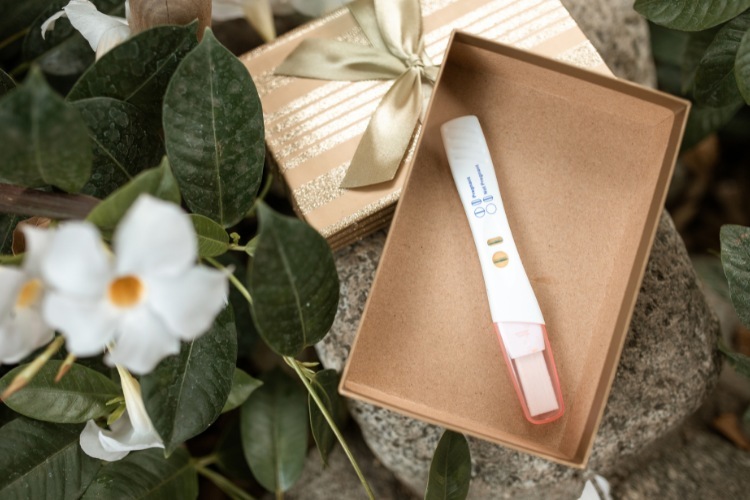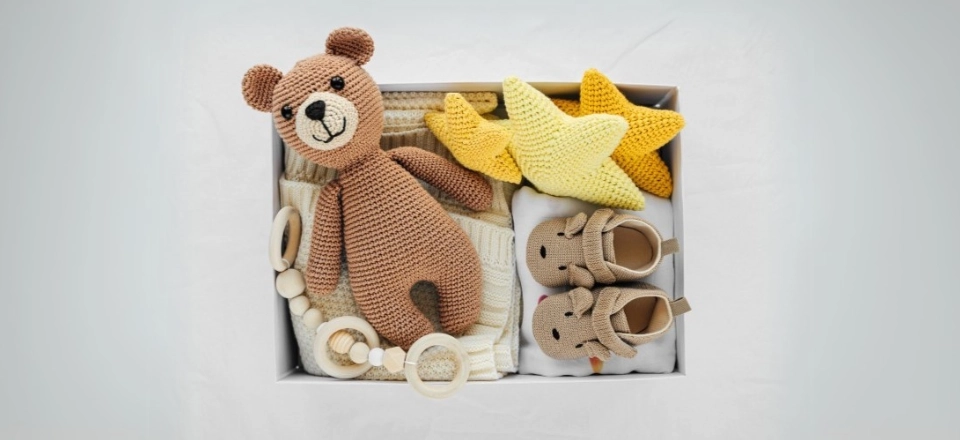Finding out you’re expecting is, for many women, one of the most intense moments of their lives. It can be a joyful surprise, a long-awaited piece of news, but also a situation full of mixed emotions. In those moments, countless questions swirl through your mind: "How will I tell my partner?", "How will they react?", "Is this the right moment?" — and that’s exactly what this article is about.
Announcing a pregnancy isn’t just sharing a fact. It’s a tender moment that can lay the foundation for your future journey together. The way you share the news with your partner can shape their first reaction.
Below we’ll look at every aspect of this unique moment — from choosing the right time and form of the announcement, through different relationship types to handling unexpected reactions. Whether you plan to share the news romantically, creatively, or very straightforwardly, you’ll find inspiration and ideas here.
1. When should I tell my partner I’m pregnant?
The first question many women ask is: what’s the right time? For some, it’s right after a positive pregnancy test; others prefer to wait for a doctor’s confirmation. Timing matters not only for confidence in the pregnancy but also for both partners’ emotional well-being.
It’s important to consider how you feel in the moment. If you’re worried there might be a negative reaction, give yourself time and plan the announcement. Don’t rush if taking it slower feels better for you. There’s no universally right moment—only the one that makes sense to you.
With an unplanned pregnancy, it’s often best to speak openly but without pressure. Give your partner a chance to process the news. Picture how you would like the conversation to go. The decision that follows will be less hasty.
Consider the circumstances too — a stressful period at work, illness in the family, or important life changes. You don’t have to share everything immediately. A delicate moment deserves a delicate setting.
2. Preparing to share the news: How do I feel and what do I expect?
Before the announcement itself, it’s important to get clear with yourself. How do I feel? Am I excited, scared, or a bit of both? Your body and mind are buzzing with these emotions, and processing them will help you be more prepared when you talk to your partner.
We often have certain expectations about how a partner should react—"they’ll have tears of joy," "they’ll be thrilled," and so on. But expectations can lead to disappointment if reality is different. Many men react with restraint and need time to process the news. That doesn’t mean they’re not happy—they just experience it differently.
You can prepare in advance what you’ll say and how much space you want to give your partner to respond. This helps even if emotions arise that take you by surprise. Sharing your own feelings using "I feel..." instead of "You never..." paves the way for healthy communication.
Also think about what you need to hear from your partner. Support? Acceptance? Teamwork? When you name it for yourself, it’s easier to name it in the conversation. Communication becomes clearer and more honest.

3. Different relationships, different scenarios
Every relationship is different, and pregnancy arrives at different stages. In long-term, stable relationships, the announcement is often a joyful event. Partners usually share values and accept the pregnancy as a logical next step.
In new or short-term relationships, things can be more complicated. The partner is still 'new,' and a surprising announcement can trigger uncertainty. In that case, gentle, open communication without blame is even more important.
In relationships that are going through a rough patch, a pregnancy announcement can complicate the situation. Sometimes it can bring a new perspective—if both partners want to look for a shared solution. It’s definitely not a good idea to use pregnancy as a tool to hold a relationship together.
If your partner isn’t firmly part of your daily life, it’s important to speak clearly about your feelings, your plans, and, if needed, set boundaries. This is especially true if you’re unsure how your partner will react or what role they should play in your life.
4. Seven ways to tell your partner you’re pregnant
Every couple has its own communication and dynamic, which is why there are many ways to tell your partner you’re expecting. Some prefer a direct conversation, others like to lean into creativity. What matters is choosing a way that fits both of you.
The first option is a classic, heartfelt conversation. No props, no embellishing—just the two of you and your emotions. This approach is powerful in its simplicity. Choose a calm moment when you both have time to be together. Honesty, calm, and eye contact often say more than hundreds of words.
The second option is an announcement through a gift. It could be a package with a baby onesie, a pregnancy test, a book about parenting, or a mug that says "You’re going to be a dad." These days, many companies offer products you can customize, so you can come up with your own message. Use symbols that matter to both of you.
Other creative ideas include involving a pet with a tag that reads "Guarding a new arrival," or playing a game with a hidden message that gradually leads your partner to the news. Another fun idea is a QR code that links to an ultrasound photo or a note in an online album. Let your imagination run wild.

5. What if my partner doesn’t react the way I hoped?
We naturally hope our partner will be excited. But reality can be more complex. Some men are initially shocked, stunned, or even disappointed. That doesn’t mean they don’t love you—they just need more time.
The first step is acceptance. Give your partner space and time to process the news. Some reactions aren’t about you but about his inner world that has just been shaken. Men often react practically—thinking about finances, housing, logistics—while women tend to be more emotional.
It’s important not to read silence or shock as rejection. Talk to each other. Ask what your partner is feeling and what’s coming up for them. Open conversation can clarify a lot and ease tension. If communication isn’t going well, a third party—such as a psychologist or therapist—can help.
Remember that even a negative reaction may be only temporary. People change and grow. Sometimes it takes longer for a man to identify with the idea of fatherhood. Don’t push, but don’t carry it alone—share your feelings with loved ones or a professional.
6. The psychological side of sharing the news
Announcing a pregnancy isn’t just a communication act. It’s a deep psychological moment when our identity is changing—a woman becomes a mother, a partner a potential father. This transformation brings many layers of emotion.
We may feel fear: of the future, of change, of losing freedom. We may experience joy and sadness at the same time. All of that is normal. Psychologists talk about transitional phases of identity, when the old self is saying goodbye and the new one is being born.
For men, a pregnancy announcement can be a challenge to their own sense of adulthood. Suddenly there’s someone who will need his presence, care, and responsibility. If he grew up without a father figure or has unresolved family relationships, it can be more demanding.
It’s right to acknowledge that fears aren’t weakness. With sharing, support, and understanding, these emotions can be managed. Growing together begins the moment we can be honest and open with each other.
7. What to do after the announcement?
After you tell your partner you’re pregnant, the story is only just beginning. Ahead of you are conversations, planning, doctor visits, and sharing the news with loved ones. Let things unfold and give yourselves time to get used to the new reality.
One of the first steps can be a visit to the gynecologist together. Many men 'connect' with the pregnancy only when they hear the heartbeat or see the baby on the screen. Getting involved can strengthen their bond with the baby and with you.
Plan together—not just the things like the layette, but also the practicalities: where you’ll live, how you’ll share care, what you both expect. Every relationship is different, and every couple will find its own way.
And finally—don’t be afraid to share the joy. When the time feels right, you can tell family, friends, and colleagues. Many women plan this moment carefully—just like the first one, when they told their partner.
Telling your partner you’re pregnant is the beginning of a unique journey. It’s a step full of emotion and anticipation. Whether you choose a quiet conversation or a creative surprise, the key is that it fits your personality and your relationship.
Don’t wait for the perfect moment—it may never come. Instead, lean on your inner confidence that you can handle it. This is the moment you begin becoming parents—often the most beautiful role in life.

